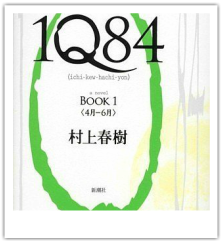 I have mixed feelings about Haruki Murakami. I have read many of his books, sometimes loving them immensely, as I did with Norweigan Wood and A Wild Sheep Chase and other times, I haven't really loved his work (The Wind-Up Bird Chronicles). What I find interesting with Murakami, is how his work in translated form manages to resonate, not just in English, but also in a swathe of European languages. 1Q84 is coming up for its release, and is being touted as an impending blockbuster. The publishing industry is foaming at the mouth at the prospect of its English language release in October. This against a backdrop of bookstore closures en masse in some countries. A recent article in The Age, the Melbourne broadsheet, highlighted that in one eastern district of the city, home to approximately 140,000 people, there was no longer a visible presence of bookstores. The area is home to a mix of socio-economic groups, large and small commercial complexes and shopping strips, and whilst the article was pointing out that the chains had abandoned the area, it overlooked the fact that there are still a handful of smaller stores scattered around the greater area. I am sure that a Melbournian reading this article would at some point have thought about the traditional view of this part of the city, of how it was always considered to be culturally bereft, true or not. Australians, mostly for economic reasons, continue to buy their books online, even from overseas retailers. Major book chains like Angus and Roberts and Borders have struggled in Australia, but not before gouging consumers with their prices, especially when you can visit the book section at a Kmart or Target store and pickup a new release for 30% less. Books are an expensive business in Australia, and the onslaught of online retailers and their success has more to do with the foolish approach Australian retail has of pushing out small business in favour of the chainstores. If you walk down any high street in an Australian capital city you will find the same stores, the same brands and the same options, who use their buying power to control pricing and to destroy the smaller businesses in the process. Then, when the chains decide that a location is no longer viable, they pick up and leave, leaving consumers with a huge void. Aside from supermarkets, Italian streets are mostly filled with small businesses, and small bookstores along with the handful of larger chains such as Feltrinelli do a good business here. Books are often cheaper here than in Australia, and with the incredibly unreliable (putting it kindly) postal service, internet shopping is not considered a viable alternative for many. So what you have here is a market place filled with options, and that leads to these bookstores small and large to be constantly full of people browsing and purchasing when they can. My goal is to now start reading in Italian, and purge myself a little of my reliance on English books and literature. Maybe I won't start out reading a Murakami translation, but, I will head down to my local bookstore and enjoy those languid moments of leisurely leafing through books until I find something that I think I am going to love sufficient.
0 Comments
|
Dave
|
|
|
Dave Di Vito is a writer, teacher and former curator.He's also the author of the Vinyl Tiger series and Replace The Sky.
For information about upcoming writing projects subscribe to the mailing list. Dave hates SPAM so he won't trouble you with any of his own. He promises. |




 RSS Feed
RSS Feed